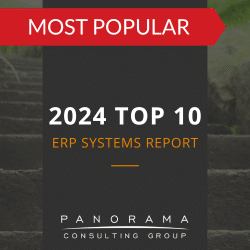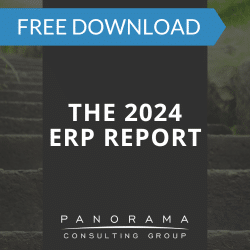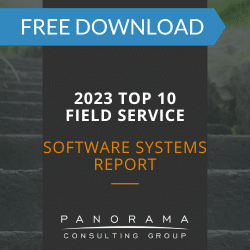Have you recently selected new ERP software for your organization? As you prepare to begin implementation, it’s important to assess how your employees feel about the change.
If you’ve undergone other changes in the recent past, your employees might be suffering from a degree of change fatigue. This can feel like too many things are shifting under their feet at once, breeding feelings of resentment.
Today, we’re diving into the signs to look for and how to overcome change fatigue so you can prepare your workforce for the transformation ahead.
Recognizing the Signs of Change Fatigue
Before we dive into the process of dealing with change fatigue, let’s briefly discuss how to identify it within your own organization.
First, it’s important to distinguish between change fatigue and change saturation.
Change saturation occurs when a company adopts new technologies or processes at a pace that exceeds its capacity to adopt them. Implementations that were meant to help your organization suddenly seem like they’re hurting it. You may find that it’s difficult to prioritize projects, assign tasks, and measure outcomes.
In time, change saturation creates a response within your workforce. This is change fatigue. It’s a personal and professional reaction to a string of changes that employees find difficult to maintain.
A few signs that your teams are struggling with change fatigue include:
- Frequent and vocal change dissent
- Employees who appear visibly tired
- Disengagement or apathy around current or new changes
- Low workplace morale
- Skepticism around proposed changes
Change Management Case Study
The client recognized their need for more comprehensive change management, so they asked us to fill in the gaps. We developed a robust communication plan to supplement the vendor’s communication approach.
What Causes Change Fatigue?
Humans have the innate ability to survive significantly stressful situations. However, this resilience can degrade over time. While massive, enterprise-wide transformations can decrease employee resilience, it’s also diminished by smaller-scale, everyday changes that occur on a more frequent basis.
This is especially true when a new stressful event occurs before a previous one is resolved. When stress snowballs like this, it can weaken employees’ ability to pivot in a new direction as required.
According to recent research, 83% of U.S. workers now suffer from work-related stress in this post-pandemic world. As everyone continues to adjust to the new normal, there’s an already-heightened level of stress present. Adding another stressful event, such as an ERP implementation, can send some employees into fatigue mode.
While this doesn’t mean organizations should avoid IT projects and digital transformations, it does mean it’s important to handle these changes with care.
Consequences of Change Fatigue
Change fatigue isn’t just something that affects employees on an individual level. Ultimately, low employee performance can affect the output of your entire organization.
Employees who experience change fatigue usually produce less because even when they are on task, they might be less engaged and motivated, which can lower their quality of work. Some employees even quit their jobs altogether.
These sentiments can spread throughout an organization, especially when the affected employees are vocal about their experience. This can lower morale, which also affects your customers, partners, and other stakeholders.
How to Overcome Change Fatigue
It’s possible to reduce the risk of change fatigue within your organization. To do so, team leaders should keep a close eye on how even the smallest changes are affecting their employees.
In addition to the major projects, consider how the peripheral ripples of change could be taking their toll.
How are your employees experiencing new practices and processes, and what is the ideal experience you envision for them? If there’s a gap, be sure to review your change management strategy.
Organizational change management (OCM) is an approach to change that takes a people-based perspective. An OCM plan includes steps designed to maximize end-user understanding, minimize resistance, and help employees seamlessly transition to a new platform.
While it’s common to offer support at the beginning of a change, many project teams fail to extend that same support throughout the life of a project. By offering the same level of commitment and attention at the middle and end of the implementation, you can prevent change fatigue and encourage user adoption.
In addition, there are two focuses you can prioritize at every point of an organizational change. These include:
- Leader trust
- Team connection
If employees have trust in their leaders and stakeholders, they have a higher capacity for change.
Likewise, they’re less likely to be derailed by change if they share a sense of belonging and community with their team members. This kind of cohesion can help them feel less alone in the change and can minimize frustration and resentment.
The Only Constant in an Organization is Change
As you implement new enterprise software, you may experience some level of change fatigue among your team members.
Fortunately, there are steps you can take to get everyone back on course. By prioritizing organizational change management, you can alleviate the stress associated with new workflows and assist employees in learning more about the new tools at their fingertips.
Our team of change management consultants can tell you more about how to overcome change fatigue. Request a free consultation below to get in touch with our gurus.














